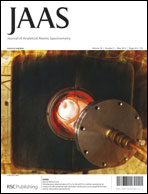The development of an automated chemical and mechanical sequence is presented for actinide analysis by inductively coupled plasma mass spectrometry (ICP-MS) using a column-based chromatographic system with TRU resin for matrix separation. The approach yields a robust method that allows for simple handling with high sample throughput for use in rapid response scenarios. Nanogram-level studies were carried out using ICP-MS with mono-isotopic spiked samples. Sample throughput was extrapolated to successfully handle over 2000 samples a day. This process includes a manual valency adjustment allowing for direct optimal loading while simultaneously minimizing sample dilution, an automated solid phase extraction platform, and a unique transfer system for flow through from the extraction to the ICP-MS detection platform. Bed volumes, reagent compositions, resin environments as well as volume and flow rates were optimized to increase recovery. Under optimal conditions the average recoveries over the range from 0.1 to 1.0 μg L−1 were 238U 106.3 ± 5.4%, 237Np 100.5 ± 2.3%, 242Pu 94.3 ± 5.2% and 232Th 109.2 ± 4.8%. Using synthetic urine as a complex matrix the recoveries were 238U 96.2 ± 1.6%, 237Np 95.4 ± 1.7%, 242Pu 81 ± 2.4%, 232Th 98.8 ± 1.7% and 241Am 53 ± 3.6% for samples at the 1 μg L−1 level co-eluted with a 0.5 M HCl/0.3 M oxalic acid solution. These high recoveries were obtained while successfully removing 99.999% of monitored matrix ion constituents and minimizing reagent volumes, culminating in the development of a method that allows for rapid onsite handling of a large number of samples while maintaining high recovery and consistency inherent to automation.

You have access to this article
 Please wait while we load your content...
Something went wrong. Try again?
Please wait while we load your content...
Something went wrong. Try again?


 Please wait while we load your content...
Please wait while we load your content...